Panhandling in Fayetteville, What to do?
Fayetteville, N.C. – Panhandling in Fayetteville has always been a problem primarily because Fayetteville has traditionally committed ignorant acts that attract panhandlers rather than repel them.
Fayetteville police have the panhandlers trained to stick out their hand for handouts when officers approach instead of having them trained to pack up and leave for other cities more suited to their nonsense.
The Fayetteville Police Department assigns a police officer to allegedly provide a uniform way to work with and identify homeless persons. The program is supposed to facilitate an effective communications network between the City and local homeless providers.
One of the primary goals was for the homeless officer to identify these vagrants’ families and put them on a bus back to their families. Apparently either this isn’t working or the goal isn’t being met for some other reason that needs to be explained to the taxpaying citizens.
The Homeless Project Officer assists what are in reality vagrants, beggars, moochers, con artists, and thieves with getting connected with shelter, clothing, food, financial assistance and other creature comforts. This only serves to keep these moochers here in Fayetteville and worse yet, attract more moochers here from the surrounding cities. Word travels fast on the hobo highway.
Listed in Fayetteville’s 2017-2018 adopted budget;
- Homeless Officer Yearly Salary $59.099.04
- $100,000 for the Homeless Management Information System
- $100,000 to continue the partnership with Cumberland County to fund strategies to assist homeless citizens
At a minimum, $259.099.04 spent this year alone on this issue with no apparent respectable return on taxpaying citizens investment.
This doesn’t even begin to cover the additional expenses incurred to the city of Fayetteville in the way of the costs of the bundles of blankets, toothbrushes, toothpaste, toilet paper, food, etc, ad nauseum… handed out every year.
How about the cost of their criminal activities and the costs to investigate, arrest, convict and jail them?
Of 63 arrests that resulted in guilty verdicts reported in a 2016 Fayetteville Observer article, only two resulted in fines in Cumberland County District Court – one for $10, and the other for $50.
For almost three out of every four guilty cases, court costs were waived and no fine was levied. Several defendants, however, did wait in jail for a few days before their cases were heard creating a drain on taxpayer dollars.
About a third of the panhandling citations were dismissed by prosecutors, as were 14 percent of the panhandling arrests. The reasons aren’t clear, but a court clerk wrote on one dismissal “per treat as warning.”
Last year [2015], the Fayetteville police Department arrested 92 people – 14 of them were repeat offenders – and wrote 39 tickets for panhandling, which is sometimes referred to as “soliciting alms” in court records. One 52-year-old man who lives on Bragg Boulevard was arrested for panhandling nine times on as many dates. He was given a 15-day jail sentence last year.
And worse yet, many are valor thieves. They claim to be prior military to create sympathy and because they know that law enforcement and the courts are too busy to check and take their word for it. Big mistake, they lie.
And what about the cost to business owners who have to put up with the bums invading their parking lots and even inside their stores bothering and driving away their customers?
No one has any problem assisting the truly homeless. It is a solid immutable part of American culture to help the helpless whenever possible. Those whom people take exception with are the ones who seek to take advantage of American generosity, those who should more rightfully be referred to as vagrants, beggars, moochers, con artists, and thieves. The ones that choose to live the life of the drunken and drugged whose only goal is to acquire their next bottle or fix.
The ones that are not “homeless” because even if you gave them a house to live in they would not take responsibility for it or care for it. They would destroy it leaving urine and fecal matter in EVERY room and create an environment for disease and rodents. Law enforcement has reported seeing this many times.
Those vagrants and moochers you still see at the street intersections in the city begging for money have been offered shelter, food and work many times on at least a weekly basis. These misfit dregs of society have essentially refused help because it’s not help that they want. They want money in hand so they can go to the nearest street drug dealer or convenient store and buy the substance they want the most, beer and illegal drugs.
They can make as much as they need as quickly as they need panhandling, perhaps $10 to $20 dollars an hour. If they didn’t get enough panhandling to support their addictions, they would have left long ago.
Another misrepresentation is that a large number of these ‘homeless’ have nowhere to go and that’s why you see stories about them being found living under bridges, in cars, in garbage bag tents or cardboard boxes. This is also not true. Law enforcement often reports that their numerous attempts to get these individuals into shelters and other programs are steadfastly refused because these people know that they will not be able to keep their drugs and alcohol and get high or drunk in these shelters, transitional homes or other roofs over their heads. They choose to live outdoors under the bridges, in cars, in cardboard boxes or abandoned buildings so they can freely imbibe in their drug of choice unhindered.
Solutions
The first thing that needs to be done is put a stop to all the attractors that are drawing and keeping these vagrants, beggars, moochers, con artists, and thieves in our city.
It is completely moronic to spend so much of taxpayers’ dollars on projects and programs that attract these vagrants, bums and moochers to our city and then end up paying out even more taxpayer dollars to support them once they’re here.
Just as the primary goal is to make life so rough for criminals here that they choose on their own to leave the area for easier pickings, the same principle applies to these vagrants.
Panhandlers vs. Homeless
Next is to acknowledge just who is “homeless” and who is really a vagrant, beggar, moocher, con artist, and thief. The city of Fayetteville simply has to stop conflating the two very different types of people.
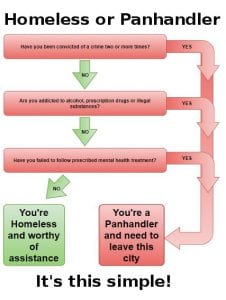 “Homeless” should be strictly defined as a person who through no fault of their own such as criminal activity, addiction to illegal drugs, prescription narcotics or alcohol or failure to adhere to prescribed mental health treatment, and who is working or continuously legitimately seeking work through officially recognized means and organizations, is completely without shelter and food and engages in acts of begging for money, other goods or services.
“Homeless” should be strictly defined as a person who through no fault of their own such as criminal activity, addiction to illegal drugs, prescription narcotics or alcohol or failure to adhere to prescribed mental health treatment, and who is working or continuously legitimately seeking work through officially recognized means and organizations, is completely without shelter and food and engages in acts of begging for money, other goods or services.
“Panhandler” should be strictly defined as a person who through fault of their own such as criminal activity, addiction to illegal drugs, prescription narcotics or alcohol or failure to adhere to prescribed mental health treatment, and who is not working or continuously legitimately seeking work through officially recognized means and organizations, is completely without shelter and food and engages in acts of begging for money, other goods or services.
Signage
Signage is a cost effective way of dealing with panhandlers and the enablers who make the nuisance worse. Educating the public to not give them money because of the many problems it causes can go a long way towards resolving the problem. All some people need is “permission” to ignore these moochers and they will be happy to do so as it takes the false feelings of guilt away that have been generated by liberals looking for handouts.
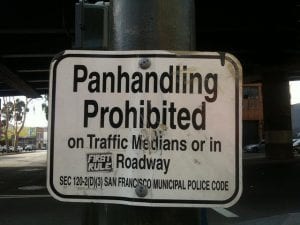 | 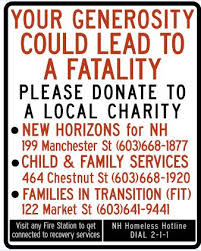 | 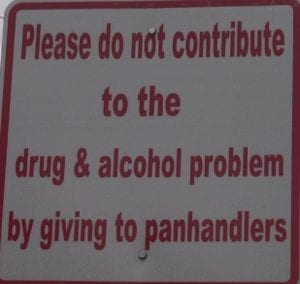 | 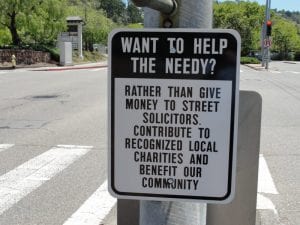 |
Physical Barriers
Modify the environment to discourage loitering or panhandling. There are plenty of options that can be employed that would put a stop to panhandling in areas where it creates nuisances or danger.
 Roanoke Va. has had high success at keeping panhandlers from roadside panhandling by creating natural rock areas in places where they stand to beg. The use of large rocks make it impossible for them to comfortably stand there and beg.
Roanoke Va. has had high success at keeping panhandlers from roadside panhandling by creating natural rock areas in places where they stand to beg. The use of large rocks make it impossible for them to comfortably stand there and beg.
A very inexpensive and effective way to deal with panhandlers compared to the traffic disruptions and overall nuisance to citizens.
 Eastern Blvd (Highway 301) at Grove St. is a very common location used by panhandlers. The installation of an irregular stone veneer on the median would stop panhandlers standing in the median and being a nuisance to citizens who catch themselves held hostage by the stoplight.
Eastern Blvd (Highway 301) at Grove St. is a very common location used by panhandlers. The installation of an irregular stone veneer on the median would stop panhandlers standing in the median and being a nuisance to citizens who catch themselves held hostage by the stoplight.
 Many trapped at stoplights by these vagrants are intimidated into handing over money.
Many trapped at stoplights by these vagrants are intimidated into handing over money.
In a city that has over 600 beds in shelters for people and several soup kitchens to feed anyone it boggles the mind that anyone would ever need to stand in the street and beg for money. All they want is money for illegal drugs or alcohol. Why would anyone would give them money and help them kill themselves!
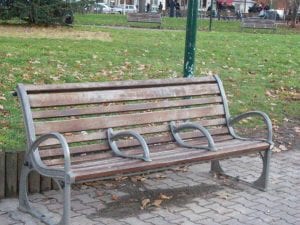 Modifying our city’s park and bus stop benches will also deter sleeping on them by vagrants.
Modifying our city’s park and bus stop benches will also deter sleeping on them by vagrants.
After all, these benches are for the enjoyment of those who contribute to the city in the way of benefiting the economy like shopping, traveling back and forth to work, or just simply enjoying the beautiful city that they helped to create, not leach off.
Also available are cost effective decorative metal and concrete balls, spikes, pyramids and numerous other methods to make a surface hijacked by vagrants and bums irregular and uninviting as a place to sleep, sit or gather, yet remain visually acceptable to customers and citizens.
 |  |  |  |
Water Barriers
The use of water is also a great anti-vagrant deterrent.
By using common items like motion sensors, water sprinkler/shower heads and a little ingenuity one can easily and inexpensively create a cost effective system to deter vagrants from gathering behind bushes, in alleys or just about anywhere.
Here is an example of a business that got tired of nasty people defecating and urinating in the alley behind their business.
City Ordinance
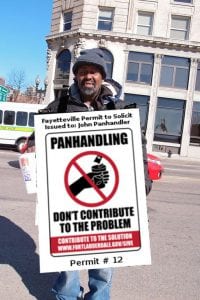
City Attorney Karen McDonald has repeatedly informed the council there are no additional restrictions the city could legally add to the panhandling ordinance but that’s not true. McDonald apparently doesn’t have the ability, desire or initiative to think “outside the box”.
Fayetteville has the legal right to require panhandlers to acquire a permit to solicit within the city limits.
There is nothing that requires the permit to be a 3 inch by 2 and a half inch card though.
The permit can certainly be a 3 foot by 2 and a half foot sandwich board that is required to be worn as the outermost article and unobstructed by anything when soliciting.
And there is nothing that says that the sandwich board can’t advertise the city’s position regarding panhandling.
Of course the sandwich board should be made of tough lightweight plastic that is printed on all sides front and back to prevent them from hiding the city’s message or easily defacing it.
Banishment
The idea of banishment is quite appropriate and not “out there” at all.
- A Washington, D.C. judge ordered a man to stay out of the District of Columbia as a condition of his release from jail on January 24, 2013.
- In 2000, a Kentucky judge banished a domestic abuser from the state for one year.
- Prosecutors in Georgia routinely banish defendants from 158 of Georgia’s counties, forcing those defendants into the only remaining county. This happened to Gregory Terry, who pleaded guilty to aggravated assault, aggravated stalking and five other charges in Douglas County, Ga. in 1995.
Liberal N.C. attorneys like to cite State v. Doughtie, 74 S.E.2d 922 (N.C. 1953) and state that judges can not banish in N.C. courts but this is only true should a judge attempt to banish a person from the State of N.C.
There is no case law in North Carolina dealing with banishment from a county, or several counties within N.C.
There is a quite sensible argument that “banishment” is actually much less cruel as it provides the violator with a far greater freedom of the “pursuit of happiness” called for in our United States Declaration of Independence than does incarceration.
If your goal is to reduce crime in your community then why not incorporate the punitive action of banishment? There can be no doubt that such banishment would reduce crime because the 30% that are repeat offenders committing 70% of the crime would soon be banished from the city or county.
The biggest bonus would be that it does not cost anything. You would not have to support a nonworking miscreant with an attitude at a cost of $93.57/Day – $34,153/Year. Being banished they would have to support themselves, and not be leeching off our hard earned citizen tax dollars.
Another bonus would be the reduction of inmates in our jail/prison system. If you were to institute banishment from Fayetteville (or better, Cumberland Co.) after the conviction of three illegal solicitations or begging of alms, (no combining and no consolidation allowed) you’d soon find that crime and panhandling nuisances would be tremendously reduced at no additional cost.
To enforce banishment the judge would make it a part of the sentence that the banished offender, whenever sighted in the county again after sentencing, is to be immediately transported by law enforcement to the furthest county line and deposited. It shouldn’t take no more than one expulsion to convince them that they need to seek their fortune elsewhere. And word would travel fast on the hobo highway that Fayetteville doesn’t cater to panhandlers.
Before the liberal whines begin, take note of the many citizens who go through life incurring no criminal status whatsoever. It’s not like it can’t be done. It can easily be done if one is a decent human being.
The courts have consistently upheld intrastate banishment as a legal and effective sentencing tool. It should be noted that 9 times out of 10, the defendant opts for banishment over a prison stay. Most banishment sentences are negotiated plea agreements where the defendant agreed to banishment in lieu of going to prison or jail.
All that is necessary for a “banishment” to be constitutionally permissible in the State of N.C. is that a banishment provision;
- Must bear a reasonable relationship to the purpose of probation,
- The ends of justice and the best interests of the defendant and the public must be served,
- The public policy must not be violated,
- The rehabilitative purpose of the probation must not be defeated,
- And the defendant’s rights under the First, Fifth and Fourteenth Amendments to the United States Constitution must not be violated.
All these measures can be easily met by a competent city or police attorney who has a desire to perform their job proficiently.
Obviously any city or police attorney displaying any kind of reluctance to pursue this measure should be viewed as having a hidden agenda and as not having the best interest of the city as a whole at heart. Or possibly just lazy and doesn’t want to put in the effort required. How can one possibly say it won’t work until they have at least tried?
In summary there are many options available to reduce the nuisance of panhandling. All it takes is the courage to stand up to the emotional incontinence of the liberally bent and demand that common sense logical measures be taken for the benefit of the citizens as a whole. It’s time to stop catering to the select few based on emotional arguments at the expense of everyone else. It’s time to make it a city policy that any program or project funded by the City of Fayetteville must meet a quarterly goal of having permanently moved “XX” number of individuals from assistance into self-reliance that quarter or the program or project will be defunded. And that no recidivism by any individual is allowed. No project or program that allows for open ended assistance with no timely cut off should be funded by Fayetteville ever again.

